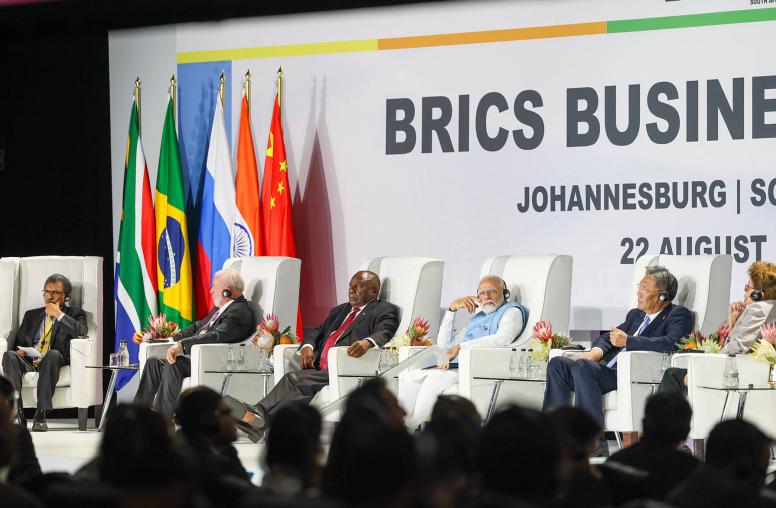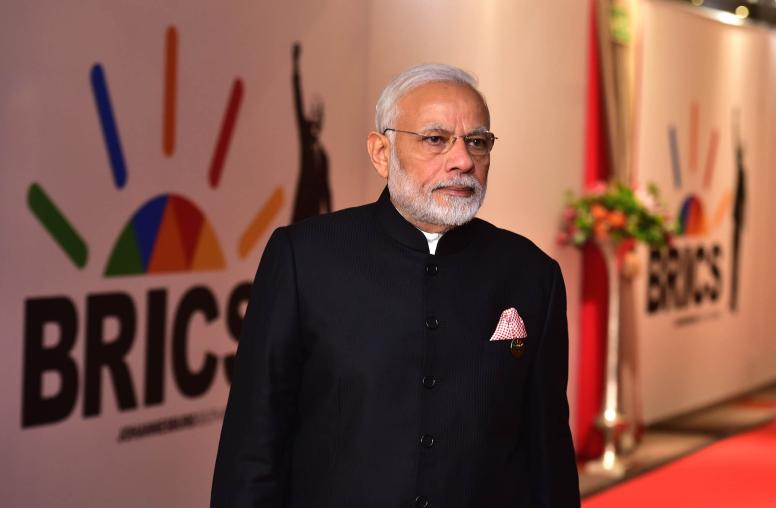Vikram Singh on Indian Prime Minister Modi’s U.S. Visit
China’s assertiveness has brought the United States and India into closer strategic alignment. But as India's Prime Minister Narendra Modi arrives in Washington, USIP’s Vikram Singh says it’s important to remember “we’re not allies, we’re partners … The Indians feel like they have to maintain a much more balanced set of relationships” in the Indo-Pacific.
U.S. Institute of Peace experts discuss the latest foreign policy issues from around the world in On Peace, a brief weekly collaboration with SiriusXM's POTUS Channel 124.
Transcript
Laura Coates: There has been a lot of conversations about President Biden and diplomacy. Well, there's now conversations as we approach a visit from Modi. We're joined now by Vikram Singh who is a Senior Adviser to the Asia program at United States Institute of Peace. He has been a leader of innovation and public policy and global affairs at the Department of Defense, the Department of State and major nonprofits. He advises the United States Institute of Peace on all aspects of peace and stability in Asia, including Afghanistan and Pakistan, Myanmar, China's role in the region, and also North Korea. He joins us now about President Biden's meeting with India's Modi. Welcome to the show and good morning, Vikram, how are you?
Vikram Singh: Good morning, Laura. I'm doing great. Nice to talk to you.
Laura Coates: I'm glad that you're here. First, but before we get into this conversation fully give us a little bit of a background as to why this visit, this aid visit, is so significant.
Vikram Singh: Yeah, absolutely. I mean, it's a pretty big deal. You know, Indian leaders, Prime Minister Modi and President Biden meet frequently, actually on the margins of a lot of international meetings. They've met at least five times and Prime Minister Modi also met frequently with President Trump also met frequently with President Obama. He's had a good relationship across parties, across US presidents. But what's happening right now as China is more assertive in the region in developing its capabilities over the last several years, the US and India have come into much closer strategic alignment over how they want to see the Indo-Pacific Region stay free and open and need to stand up to potentially Chinese assertiveness. So, it's a big deal. He's getting a state visit, which means the full 21-gun salute, welcome, you know, at the White House. He is addressing a joint session of Congress. This will be the second time he does that. So, he is getting all of the pomp and circumstance that you would accord to your closest allies and partners. But it's interesting, because India and United States are not allies the way we are with our NATO allies.
Laura Coates: Why is that?
Vikram Singh: You know, India has never sought allyship in a traditional sense, meaning mutual defense commitments with any country. It doesn't have any formal alliances. And India also approaches the region quite differently than we do as a middle power in a complicated neighborhood with Pakistan and China that are military threats right next door with the need for energy supplies and things like grain and fertilizer, including from Russia. And with a Cold War legacy of a close partnership with Russia, when we actually tilted towards China and Pakistan and the Indians tilted towards Russia, the Indians feel like they have to try to maintain a much more balanced set of relationships. So, they try to balance across different partners. So, like, even though India doesn't want Iran to get a nuclear weapon, they maintain relations with Iran, even though India would like Myanmar to be democratic, they talk to and maintain relations with that military junta, and they remain close to Russia, which supplies the vast majority of their arms and all of their strategic systems like submarines, and intercontinental ballistic missiles. And those are difficult dynamics. So, we're not allies, we're partners, and we're really focused on China.
Laura Coates: How does that impact, I mean I didn't realize it was the major arms supplier since early, what 60s and 70s, but with the changing world order, in particular. And of course, what's happening in Ukraine and our own relationship with Russia, and I use that term, loosely, when I use the word relationship. What does India's strategic diplomacy, how does that impact our ability to view them as something more than a partner, not an ally, but a partner? It could go either way then if they're not an ally in the same way, they're a partner, but there's still the support with Russia. That seems like a very sort of difficult relationship to navigate.
Vikram Singh: Well, it makes it one, a much more interesting relationship and it makes it a more complicated relationship because essentially, it you know, when it goes in a way that's not to our favor, it's because India has, for example, let's say in our perspective, too soft on Russia. On the other hand, India can potentially bridge some of those divides, and maybe down the road would play some sort of a constructive role with Russia. We already know that, you know, Modi made it very clear to President Putin that nuclear use is absolutely unacceptable. And he's made it very clear he told Putin in person that he thinks this is not an era of war. And so that middle roll it can be useful. But it can also be frustrating.
Laura Coates: Let's turn to China for a moment if we can, because there was a lot of conversations surrounding Secretary Blinken's visit as well with Xi Jinping, what came of that conversation? And is there a hope in terms of the diplomacy and the relationship?
Vikram Singh: I mean, I would call this very much a floor or some sort of beginning of some sort of left and right limits on making sure the relationship doesn't spiral into a, you know, into a crisis or a conflict. I think the and the most basic level, that means the channels of communication are open, channels of communication have been closed, and our military-to-military connections have been really shut down and are still shut down, even after Secretary Blinken's visit. And it's important to remember, you know, throughout the Cold War, even with the Soviet Union, even with threats of nuclear Armageddon, we maintained some level of communications and connection, if nothing else, to defuse a crisis and to make sure we didn't accidentally stumble into a conflict. And I think Secretary Blinken's visit has been successful at moving back towards at least that kind of, you know, a little more stability in the relationship. But we are still fundamentally viewing China's behavior in the region from its aggressiveness towards Taiwan, with in territorial disputes with Japan and the South China Sea, and along the Indian border, we're just in 2020, Chinese forces killed about 20 Indian forces and a few Chinese soldiers also were killed in clashes. We're feeling them as being aggressive. They are building up their military, and they're putting a lot of pressure on all the neighbors with whom they have any disputes, basically saying you got to follow the Chinese line. And I think we can talk about that, but we clearly with this visit, we didn't move to any sort of agreements, but at least we opened lines of communication.
Laura Coates: There's so much more to come undoubtedly on these issues and these visits coming up. Thank you for helping us to be more informed on these issues. I appreciate it so much.
Vikram Singh: Yeah, thanks a lot Laura. Have a great day.



